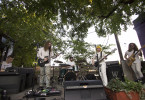Much of Creepoid’s success then and now has a little something to do with the ambiguity the band possesses; they mean something a little bit different to every listener. Comparisons usually fall into neat little cross sections, but the Philly product sees names thrown at them from all over the map: Sonic Youth, Blonde Redhead, Deerhunter, Beck, Asobi Seksu, Hole, Wilco and even Gomez.
“I grew up playing hardcore and punk, but I was a huge fan of Blur and all the Britpop stuff going on,” Patrick said of his band’s diverse backgrounds, which might explain the flexible noise. “The Creepoid stuff, we don’t sit down and discuss what it’s going to sound like. A lot of bands out there try to sound like something that they aren’t. The sound that we are making is exactly who we are as people.”
At their core, these are smoky rock ‘n’ roll songs — blue collar, lunchpail anthems that play a little darker, a little heavier, a little more twisted than their City of Brotherly Love siblings The War on Drugs and Kurt Vile. It’s a good time to be a rock band from Philadelphia, and Creepoid is looking more and more like the next one to cash in.
“Finally, we get to put what we wanted to do out on this pedestal,” Patrick said. “Before, some of us were too fucked up to do that. It took a lot of us maturing and being able to go out on the road full-time, budget and record an album properly and do this for real. That scene grew up.”
It’s in the control that weed-smothered crew applies to the music that something special is seen. They’re as adept at wistful, trudging shoegaze hikes (“Golden String,” “Nadua”) as they are at caffeinated punk bodyslams (“Gout”), usually finding their golden spot right in the middle (“Baptism,” “Yellow Wallpaper”) and happy to dance across the full spectrum to find it.
“We get fast, we get slow, we get quiet, we get loud,” Patrick said. “That’s us. It’s our thing, playing with those dynamics.”
That trait is refined on Creepoid’s new full-length, Cemetery Highrise Slum, due this June on Collect Records just a year after the self-titled effort. Written in an inspired frenzy shortly after the move, it represents something new in the band’s already impressive catalog. Ditching a lot of what lumped them in with the shoegaze crowd, the album tones down the pedals and effects to make a big, “pure and true” rock record. It’s an effort Patrick thinks could have been made only with the new surroundings and new professional arrangement, an album very much indebted to the realization that music trumped everything else.
“The underlying tone of Horse Heaven was where and how we grew up. The self-titled was asking questions. It’s very adolescent, to us, in that we want answers,” Patrick said. “The new album is us being adults, realizing this is the real thing.”





